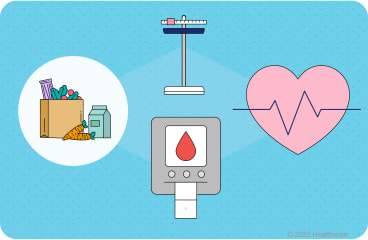
There are a few treatments that can help you lose weight. They include:
- Intensive lifestyle programs. These focus on making lifelong changes, like eating healthy foods and being more active. Making intensive, daily changes can help you lose weight. Many people lose a moderate amount of weight on these programs. But few people are able to maintain their weight loss long-term. Intensive lifestyle programs have little or no risk.
- Weight-loss medicines. These may help you lose more weight than you might lose with an intensive lifestyle program. But you may have to use a medicine for a long time. If you stop using the medicine, you’re likely to regain the weight you lost. Many weight-loss medicines have side effects, like headaches, nausea, and bowel problems.
- Weight-loss (bariatric) surgery. There are different types of weight-loss surgery. Two of the most common types are gastric bypass and gastric sleeve surgery. They can help you lose a lot of weight and can help improve health problems related to weight. Weight-loss surgeries are generally safe but involve recovery time and some risk of complications.
Losing weight can help improve many weight-related health problems, like diabetes, high blood pressure, high cholesterol, knee arthritis, sleep apnea, and problems getting pregnant. It may also reduce your risk of developing heart disease or cancer.
Only you know which option is right for you. Work with your doctor to be sure that your decision aligns with what’s important to you. Take a few minutes to compare the options and see what you prefer.
What's involved
| Intensive lifestyle programs | Weight-loss medicines | Weight-loss (bariatric) surgery |
|---|---|---|
You take part for at least 6 months in a program that includes all of the following:
After you complete the program, it’s recommended that you go to counseling at least once a month for a year to help maintain your weight loss and new habits. |
You may take pills or give yourself a shot. There are many types of weight-loss medicines. They include medicines taken by: Mouth.
Injection.
Most medicines work by helping you eat less. You will also need to:
|
You have surgery to make your stomach smaller. Two common types of weight-loss surgery include gastric bypass and gastric sleeve. After either type of surgery:
Some people may have more surgery to remove excess skin if they lose a lot of weight. Other less common types of surgery include:
|
How well it works
| Intensive lifestyle programs | Weight-loss medicines | Weight-loss (bariatric) surgery |
|---|---|---|
With 6 months of consistent participation, you may lose up to 8% of your body weight. It's common for people to regain the weight they lost. |
You may lose 5% to 21% or more of your body weight, depending on the medicine. If you have not lost at least 5% of your body weight in 6 months, you and your doctor may decide to try a different medicine. Many people regain some or most of the weight they lost if they stop taking the medicine. |
Within the first year, you may lose 25% to 30% of your body weight. After 5 years, you may have lost 20% to 25% of your body weight. Many people regain some weight. But very few people regain most of the weight they lost. |
Health benefits
| Intensive lifestyle programs | Weight-loss medicines | Weight-loss (bariatric) surgery |
|---|---|---|
If you have pre-diabetes, you can reduce your risk of developing type 2 diabetes. If you have diabetes, your blood sugar levels may improve. If you have high blood pressure or high cholesterol, your levels may improve. Other weight-related health conditions may also improve. |
If you have high blood pressure or high cholesterol, your levels may improve. Other weight-related health conditions may also improve. Some weight-loss medicines are also used to manage type 2 diabetes. These medicines may reduce the risk of a heart attack and stroke. If you have heart disease, these medicines may reduce the risk of a second heart attack or stroke. |
If you have high blood pressure, high cholesterol, or sleep apnea, these conditions may improve. If you have type 2 diabetes, it will go away completely for many people. But for some people, it may come back. You may have a lower risk of a heart attack or stroke and a lower risk of cancer. You may live longer and have a better quality of life. |
Risks
| Intensive lifestyle programs | Weight-loss medicines | Weight-loss (bariatric) surgery |
|---|---|---|
These programs have little or no risk. Some people fall into a cycle of losing and gaining weight. There may be some health risks associated with that. |
Side effects of medicines vary. You may have:
|
Within 30 days of surgery, there is a small risk of serious problems such as a blood clot or infection. There is a very small risk of death. Within the first few years after surgery, some people need more surgery to treat problems related to the first surgery. |
Cost
| Intensive lifestyle programs | Weight-loss medicines | Weight-loss (bariatric) surgery |
|---|---|---|
Most intensive lifestyle programs have fees. The programs may not be covered by your insurance. |
Some weight-loss medicines cost a lot. Some medicines may not be covered by your insurance. |
The cost of surgery varies. Check your insurance coverage. Also think about the costs of:
|
Where can you learn more?
Go to http://www.healthwise.net/patientEd
Enter H456 in the search box to learn more about "Obesity: Which Weight-Loss Treatment Is Right for You?".
Current as of: March 1, 2025
Author: Ignite Healthwise, LLC Staff
Clinical Review Board
All Ignite Healthwise, LLC education is reviewed by a team that includes physicians, nurses, advanced practitioners, registered dieticians, and other healthcare professionals.

